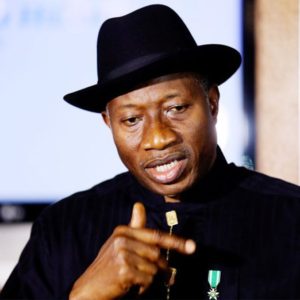Goodluck Jonathan, former Nigeria’s President, has accused some state governors of his party, the Peoples Democratic Party (PDP) of causing his defeat during the 2015 presidential election.
The governors are not the only ones being blamed, some northern leaders in the country has also been fingered by Jonathan as being behind his lost at the poll.
Barack Obama, former president of the United States, has had his own share of the blame. He was accused of interfering in the election which Jonathan lost to Muhammadu Buhari, incumbent president and then candidate of the All Progressive Congress, (APC).
The former president made the accusation in his new book entitled ‘The Transition Hour’ currently being launched in Abuja today.
“This time around, there were governors who were rounding off their eight years tenure and were blinded by ambition,” Jonathan said
“Some governors wanted to be Vice President whilst others strived to be the President. If I contested none could realise his ambition. This muffled implosion would fully manifest in the buildup to the 2015, which each ship-jumper calculating how much he or she would take from the PDP or the most opportune moment to cause maximum damage and based on that, plot their exit.
“As they jumped ship in preparation for the 2015 elections, only very few of this lots, if any at all, bothered about what the PDP did or did not do in terms of delivering our campaign promises. Their opposition to my re-election was principally driven by personal ambition. They therefore played up the issue pf where I come from and the faith, I professed to fuel their burning ambition. My performance mattered quite little, if it mattered at all,” he added.
Jonathan who took over his pricipal, Musa Yar’adua, when the latter was late said in his book that some Northern leaders and socio-political groups kicked against his constitutional right of succeeding the late Nigerian leader.
Having floored them, the former president said they waited for him at the 2011 general election with threats of making the nation ungovernable for him.
“In spite of the threats and provocations to make the country ‘ungovernable’ for me, I had the overwhelming support of Nigerians in the run-up to the presidential election in 2011. I was able to win the election to the grace of God and the love of Nigerians. The election was all but won even before the whistle was blown for some strong factors. To mention a few, the pressure to preclude me from contesting in 2011, met with solid indignation from majority of Nigerians.”
Jonathan also noted that in 2015, the same northern leaders continued to oppose his presidency and his bid to seek a second term in office, but a new element was added to the opposition: “constant fabrication of damaging stories”.
“Many reasons make the onslaught in this context very suspect especially as it was being managed by foreign experts mostly from the United States.
“Throughout my tenure in office as President, there was constant barrage of what Donald Trump has now termed ‘fake news’ coming from a well-oiled media propaganda machine. I can say as a matter of fact that were never any snipers in training or already trained. There were no lists of political enemies to be taken out.
“There was no missing $49.8 billion and more importantly I can say that even those who made these and other allegations knew that they were false. This probably explains why many of these allegations died a natural death even as the echoes of my retreating footsteps still resounded nationally and globally,” he wrote.
The former president said he faced unending insults during his tenure and one that was particularly bemusing to him was the tagging of his presidency as “clueless” despite a number of firsts the country recorded during his tenure.
He highlighted some achievement of his administration, the most prominent of which he said was the 2013 declaration of Nigeria as the largest economy in Africa, and the election of the country into the Security Council of the United Nations which occurred twice during his tenure.
He added that it was during his administration that a Nigerian, Akinwumi Adesina (his Minister of Agriculture), became the president of the African Development Bank for the first time.
